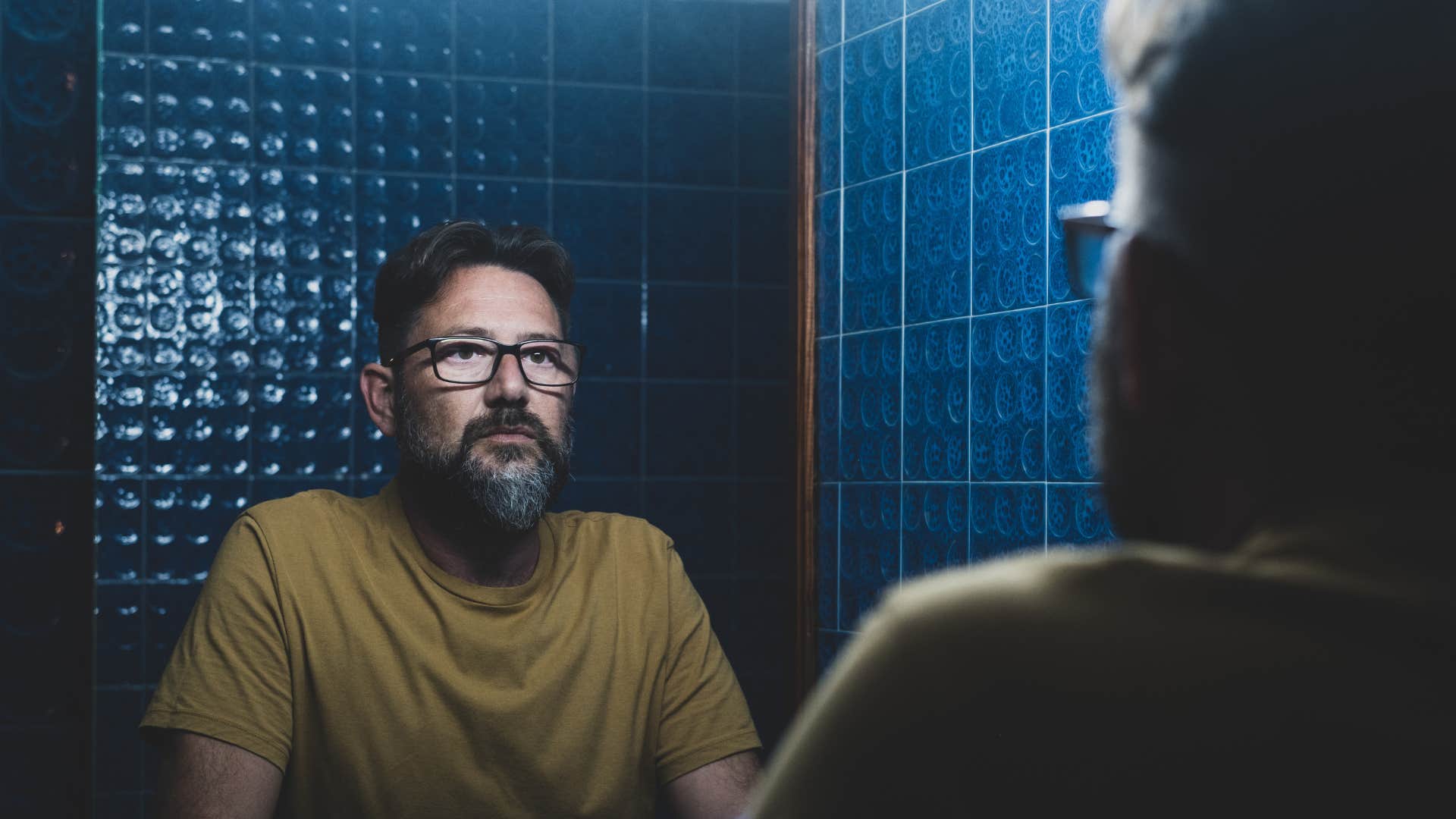11 Habits Someone Only Has If They Were Raised By Parents Who Didn't Believe In Gentle Parenting
Everyone has habits that they've gained thanks to their negative childhood experiences.
 Mangostar / Shutterstock
Mangostar / Shutterstock The way our parents treated us during childhood can shape how we see the world as adults. Those from homes where tough love was taught rather than gentle parenting grew up with a strong sense of independence out of fear, not necessity. Their parents would avoid any sort of emotional connection with them, which caused them to be wary of others and develop a sense of mistrust in themselves.
While every family is different, certain habits emerge in people who grew up in stricter, more authoritarian homes. Now, they struggle not only to make connections with others but also to seek the approval they never received from their parents as children. These behaviors aren't always healthy, but they do reveal a story of someone trying their best to protect themselves.
Here are 11 habits someone only has if they were raised by parents who didn't believe in gentle parenting
1. Constantly seeking approval
 PeopleImages.com - Yuri A | Shutterstock
PeopleImages.com - Yuri A | Shutterstock
Parents who don't believe in gentle parenting cause their children to grow up in a survival-of-the-fittest type of energy. Children who grew up with conditional love, such as receiving approval only when meeting their expectations, were revealed to have low self-esteem. As adults, they will seek approval from others, particularly those individuals who are harder to please, like their parents were.
This can be dangerous because a person who is constantly seeking approval may become upset when it never comes and may not care about the people they hurt along the way. This bitterness can be externalized towards others, thus causing a generational cycle of shame and insecurity. What makes this habit hard to break is that society places so much stock in people who seek approval because it makes them appear more accommodating.
2. Struggling with emotional expression
 Gladskikh Tatiana | Shutterstock
Gladskikh Tatiana | Shutterstock
Growing up with parents who avoid emotional moments can warp your mind and shape how you interact with others. Children who are raised in an environment where their parents emotionally stunted them often talk about how they felt when their feelings were invalidated by their parental figure. These children may struggle with identifying and expressing their emotions, leading to challenges in social interactions and increased risk for internalizing problems.
As adults, they may disregard their own feelings to keep others around them happy, as they did when they were young. Without learning about empathy or compassion, they might respond to emotional situations with anger or withdrawal. The only way for them to fix this is by seeking therapy or talking about their feelings little by little. Taking it one day at a time might unpack years' worth of traumatic childhood experiences.
3. Fear of making mistakes
 MDV Edwards | Shutterstock
MDV Edwards | Shutterstock
A fear of making mistakes comes from a parent who has set expectations that their children might not live up to. Negative perfectionism in parents was associated with increased parental criticism and permissiveness, which negatively impacted parental acceptance. This can create a dynamic where children feel they must meet unrealistic standards to gain their parents' approval. The more they try, the bigger the fear of making mistakes.
Down the line, these children will experience mental health issues that can lead to substance abuse problems. You feel as if you are hopeless, and since you can't bother to live up to your parents' standards, you put yourself in harmful situations. Those who were raised with a lack of gentle love will internalize this perfectionism and be more anxiety-prone as adults.
4. People-pleasing
 Svitlana Hulko | Shutterstock
Svitlana Hulko | Shutterstock
When someone is raised by parents who didn't practice gentle parenting, they grow up in an environment where their emotional needs are often left unmet. Not only do they struggle with expressing their emotions, but when it comes to interacting with others, they may go above and beyond for them. While that may sound commendable, when it comes to someone who doesn't genuinely care about them, it reveals that they may not respect themselves.
This causes them to become people-pleasers, an individual who puts everyone's needs above their own. Over time, this lowers their self-esteem and self-worth in the eyes of others. Breaking free from it can be challenging, but noticing the pattern and halting it is the first step down the right path.
5. Difficulty setting boundaries
 VGstockstudio | Shutterstock
VGstockstudio | Shutterstock
We've talked about suppressing your emotions and pleasing people, but there comes a time when you have to put other people's opinions aside and set strict boundaries for yourself. In a home where boundaries are blurred, it can be hard to grow out of that mentality. Children who grow up in homes where boundaries are placed with the highest importance are crucial for setting a standard on how kids should be treated as adults.
Setting clear boundaries within a home can prevent your children from participating in delinquent behavior, and doing so will make your children respect themselves more. The reason they find setting boundaries so difficult is that when they try, they are met with animosity or contempt from their parents for even attempting to do so. As adults, they now have to go back and redefine their boundaries to unlearn all of the bad behaviors that their parents instilled in them.
6. Harsh inner critic
 Perfect Wave | Shutterstock
Perfect Wave | Shutterstock
Everyone is their worst inner critic, but for children who grew up without gentle parents, any move they make calls for second-guessing. Instead of learning self-compassion, they internalized the voice of a parent who used to shame, punish, or emotionally withdraw from them. This is because early harsh parenting can seed a persistent internal critical voice.
As silly as it sounds, talking back with positivity to your own inner critic is the best way to silence it for good. This is the only way to heal your inner child and learn to accept praise. Breaking this particular habit requires you to replace judgment with optimism. Only then can that inner voice begin to mute itself slowly.
7. Hyper-independence
 Antonio Guillem | Shutterstock
Antonio Guillem | Shutterstock
Being independent isn't necessarily a bad thing to instill in your children. However, if it stems from a place of parental neglect, it reveals just how much someone had to endure as a child. Parents who simply don't care for their children will have them in survival mode, often because of their own apathy. These types of parents fail to teach any major lessons. They are simply too lazy or uncaring to validate their children's emotions or even attend to their basic needs.
The forced independent child grows into a hyper-independent adult who doesn't rely on anyone for help because they have been let down by the people who were supposed to take care of them. It's a sad reality for many, but by discussing what they went through and slowly learning to trust others again, they can learn to ease back on this independence. True emotional security is having people who you trust to be around to help you in case something happens.
8. Conflict avoidance
 Kmpzzz | Shutterstock
Kmpzzz | Shutterstock
Knowing how to solve conflicts in a family dynamic is important for children to learn, especially if they have siblings. Avoiding conflicts is a staple in a home with a tough love approach. Emotions are not as openly expressed, and the chances of two family members solving their issues with one another are slim.
This type of avoidance is easy to fix if one is willing to do it. It can be hard to forgive someone in the family for wronging you, but sometimes it's not even about solving it in that way. You can solve conflicts without having to forgive someone. All it takes is for you to start a conversation about the wrongdoing.
9. Low self-worth
 Studio Romantic | Shutterstock
Studio Romantic | Shutterstock
Parents who neglect their children tend to focus more on themselves. This causes neglected children to have lower self-worth. This can lead to a range of other issues in adulthood, including people-pleasing, low self-esteem, and vulnerability to exploitation by others. They learn by example, and if a parent is highly critical of themselves, then they will pick up on that and begin to view themselves in the same way.
They may even learn to define their worth by how well they obey or how rebellious they can be. This is all on the neglectful parent, who will put anything or anyone above themselves. Being a neglectful parent can increase the risk of depression in your child by 50%. This number shows how important it is for parents to build up their child's self-worth and self-esteem rather than diminish it.
10. Overreacting to criticism
 MDV Edwards | Shutterstock
MDV Edwards | Shutterstock
Sensitive adults will overreact to criticism because, as children, they were not taught by their parents how to regulate their emotions appropriately. While this isn't entirely their fault, now that they're older, they should learn how to unpack this trait and use the criticism constructively in order to better themselves. If they don't, they stay in a place of anger, bitterness, and resentment either towards their parents or the person criticizing them.
Some people want you to be a better person, and that criticism might actually be valid, no matter how much it triggers you. Understandably, the critic has someone bring up a childhood wound, and you feel like that vulnerable child you once were, but to respond angrily is unnecessary. In fact, it shows that you haven't dug deep enough into fixing your childhood trauma yet.
11. Difficulty trusting others
 My July | Shutterstock
My July | Shutterstock
Children raised without gentle parenting grow up in places where safety is inconsistent or absent. This causes them to be in a state where they are constantly looking over their shoulder for strangers who may potentially harm them. As they grow into adults, they can't turn their brains off from this and will look at any new person they meet with utter suspicion.
Whether it's relationships or friendships, they will struggle with a fear of betrayal because their nervous system is wired that way. This is one of the toughest hurdles they will face, as it's not easy to trust others. Healing takes time, and learning that not everyone is out to get them is a gradual process. In the back of their minds, their parents' failures will linger for the rest of their lives.
Sylvia Ojeda is a screenplay writer and journalist who covers self-help, relationships, culture, and human interest stories.

